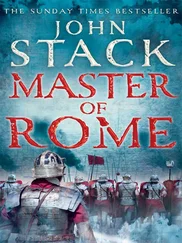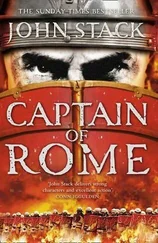‘What’s your name, slave?’ Septimus asked, the last word spat in derision to raise the ire of his opponent.
‘Khalil.’
‘Well, Khalil, I will teach you a lesson or two today,’ Septimus taunted as he began sidestepping to his right, opening a circle of two arms’ length.
‘Not before I shame you in front of your men, Roman,’ Khalil replied, menace in his voice.
Septimus was shocked by the threat, the audacity of the slave to speak so aggressively to a freeman.
Khalil registered the surprise on the centurion’s face and used the moment to attack. Septimus was caught off guard and was forced to backstep as the Nubian’s blows came in fast and high. The centurion cursed himself for the momentary lapse in concentration; the simple trick of the Nubian had broken his thoughts and exposed him to the incisive attack.
Septimus counterattacked, parrying the Nubian’s blade before striking low, aiming to unbalance his opponent and go on the offensive. Within seconds he knew he was evenly matched. Septimus had years more experience with a sword, but much of that was in the legions, with only ten months of one-on-one combat training. Khalil had over twice that amount in single-combat training, his tutors the best gladiatorial trainers that Scipio’s money could buy. Septimus had balance and timing on his side, Khalil had practised technique – and each man tried to force the fight into their realm of strength.
Septimus stepped back again as Khalil flowed into a twelve-stroke sequence, a seamless series of blows that twice penetrated Septimus’s defence on the torso and upper thigh. Septimus grunted as each blow struck, the heavy wooden sword raising the purple hue of bruising under the skin. Septimus counterattacked with a series of his own; the strokes were less defined than Khalil’s, but the Nubian was forced to react quickly to avoid injury. Septimus kept the pressure up, never allowing the Nubian to pause between attack and counterattack. The unrelenting pace began to take its toll and Khalil grunted heavily as Septimus punched the hilt of his sword into his stomach. The gladiator roared in anger as he attacked again, but Septimus used his superior balance as a defence, causing Khalil to overreach on the final strike, opening the opportunity for Septimus to immediately go on the offensive.
Atticus watched in silence from the forward rail of the aft-deck. At the beginning of the fight he had cheered Septimus along with the rest of the crew, but now he watched in avid fascination as the fight developed. The balance between the two men was incredible. After nearly ten minutes of fighting, Khalil was clearly feeling the effects of the extended fight in his sword arm. His strikes were not as fast as before; however, the sequencing was every bit as deadly, and Septimus was struggling to fight off another attack.
Both men fought on, sweat streaming from every pore, every strike now accompanied by a grunt of exertion from attacker and defender. A killer blow was yet to be struck, but both showed signs on their bodies of where defences had been overcome and their flesh had suffered the lash.
‘Enough!’
All eyes turned to the source of command; all except the two fighters, who backed off imperceptibly, their gazes locked, their chests heaving in unison. Scipio descended to the main deck and approached the fighters. He eyed them both slowly, as if balancing them in his mind, his thoughts advancing the fight to an unseen conclusion.
Before the fight, Scipio had been sure of Khalil’s superior skills. Within seconds of the beginning, however, his keen eye had discovered the gladiator’s obvious disadvantage. Gladiatorial fights were rarely to the death, and rarer still for fighters of Khalil’s calibre, when swordsmanship was the attraction of the contest. The centurion, on the other hand, had fought many times when death was in the offing and knew of no other way to fight. For the centurion it was kill or be killed; for the gladiator it was draw first blood and claim victory. Without that exposure to mortal danger, Khalil would never be the centurion’s equal. Scipio was sure, however, that in a fight to the death Khalil’s steely ferocity would adapt, and no man, certainly not a brute centurion of the marines, would stand against him.
‘You fight well, Centurion,’ Scipio said, his voice betraying the hollow words.
‘Thank you, Consul,’ Septimus replied, drawing himself to attention.
Scipio nodded his head curtly to Khalil and turned towards the hatchway to the cabins below. He descended without another word, his personal guard and the Nubian slave following. Only when they were gone did the marines break the silence, the abrupt end to the fight sparking immediate arguments as to the victor and how the bets would be settled.
Septimus let them argue, his eyes never leaving his assailant, even when all that remained was an empty hatchway. He had never fought a man of such ability, and he rolled his shoulder instinctively against the sharp pain of a heavy bruise on his upper arm. Throughout the rest of the day he waited for the slave to return from the decks below so he could discuss the fight and the incredible sequence of strikes that seemed so effortless. He waited in vain, for neither Khalil nor the consul re-emerged.
Atticus could scarcely believe the sight before him. Everywhere he looked the sea was filled with all manner of ships, from the smallest skiffs, through merchant galleys, to the massive transport barges of the grain trade. Atticus felt an overwhelming sense of movement, of constant frenzied activity as ships travelled in all directions, their courses crisscrossing each other, with some setting sail for distant ports while others were reaching their journey’s end here, in Ostia, the port town of the city of Rome.
The Aquila had sighted land at dusk the evening before and had turned its bow northwest along the ragged coastline of the Italian peninsula. During the night they had passed Naples on their right, its lights scattered over the shoreline of the crescent bay and on into the hills beyond, the individual lights in the dark a mirror of the heavens above. The offshore breeze blowing from the city had filled the air with the smell of wood smoke from countless cooking fires, and underneath the musky scent of humanity from the tightly packed confines of the hidden city.
After the multitudinous lights of the city, only solitary pockets of light around small fishing villages remained. The mainland became dark once more, its existence off the starboard rail of the galley marked by a brooding presence that all aboard could feel, an unnamable sensation that constantly drew the eyes of those on board towards the shadowy features of Italia.
As the night wore on, the Aquila found company in the water from other vessels travelling the same route to Rome, the number increasing until finally at dawn, with the galley still some ten miles from Ostia, the brightening vista exposed a multitude of craft in the surrounding sea, a host that was compressed in the mouth of the harbour where the Aquila now lay.
The smaller craft in the water gave way to the galley, her bronze ram a deterrent that forged a path through the throng of lesser vessels. Further in, Gaius wove the galley around the larger transport barges, the Aquila , a more nimble ship under oar, giving way to the less manoeuvrable sailing ships in the time-honoured courtesy observed by all capable sailors.
Ostia, at the mouth of the river Tiber, had been founded by Ancus Marcius, the fourth king of Rome, over three hundred years before, and its growth and prosperity was intimately tied to Rome, a symbiotic relationship that had seen the once-small fishing village become the trade gateway to the greatest city in the world. Now the Aquila carried one of the most valuable cargos that had ever entered the port, a vital message to the Senate borne by the leader of Rome itself, a message that held the fate of the forty thousand fighting men of the legions on Sicily.
Читать дальше
Конец ознакомительного отрывка
Купить книгу











